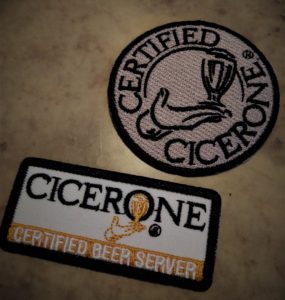Earlier this year, Cicerone founder and all-around beer guru Ray Daniels published an article where he bemoaned the inability of many Advanced Cicerone candidates to describe beers qualitatively. Sure, they can cite the IBUs and SRMs (numeric values for a beer’s bitterness levels and color) but when it came to describing beers in everyday language, many floundered.
“Through the Cicerone program,” Daniels wrote, “we hope to encourage the use of specific, descriptive flavor words by everyone who participates at any level. We are thrilled when a Certified Beer Server appropriately describes the flavor of a beer as ‘malty,’ but from a Certified Cicerone®, we would hope for more detailed malt descriptions such as ‘toasty,’ ‘caramel,’ or ‘nutty.’ And by the time we get to the upper levels, we hope for greater specificity on words like ‘citrus,’ for example expanding to name specific citrus fruits and even potentially specific varieties of fruit.”
The article got me thinking.

I have been a Certified Cicerone® for eight full months. What do I do now? I don’t work in the beer industry, so my certification doesn’t lend much street cred to my other job. But these last few months, I truly have enjoyed telling people about what being a Cicerone means and going toe-to-toe with my drinking friends when dissecting various beers. What should my next move would be?
For most self-respecting Ph.Ds., the answer is simple: more education!
Let’s face it…it’s pretty clear to me I will eventually attempt the Advanced Cicerone certification at some point in the future. I was in some ways disappointed that I squeaked by with a minimal 80% score on the Certified exam. I know I can do better. In order to pass, I need to continually work on upping my beer knowledge. Daniels’ article about the general weakness in Advanced Cicerone candidates coincides with my personal weakness—general style knowledge and the ability to describe a beer in plain language.
All this leads me to the next big thing for this blog (as if this blog has ‘big things’)—the “Best Beer” Series.
When thinking about how to study and prepare for the Advanced exam, I need to spend more time writing about specific beers. I believe that the best way to learn information is to transform that information—turn it into something else: an infographic, a PowerPoint, a blog. [That’s how I passed squeaked by the Certified exam: I read; I wrote.] That process led me to conceive of this new series…writing about Arizona’s best beers.
Beginning soon, I will occasionally, but continuously, write about Arizona’s best beers. I will choose one beer from a brewery’s core beers that I feel is the best representation of their work, and profile that beer, attempting to use Daniels’ language suggestions.
Put another way, if you visited an Arizona brewery and could only drink one of their beers, by reading my description of the beer, you would know exactly what the beer drinking experience would be like—the flavor, the aroma, mouthfeel. That’s the goal, anyway.

For example, North Mountain’s CREEM Ale isn’t simply a golden ale. It uses desert wildflower honey to create sweetness but adds rye to temper the sugar; rolled oats add creaminess to it. Drinking it is like watching bees tend to Mexican poppies along the Beeline Highway in March and April after an especially damp winter season. Or something like that.
By way of preview, I’ve started to identify a few Arizona brews that will make the list: the aforementioned North Mountain’s CREEM Ale, Sleepy Dog’s Tail Chaser IPA, Button Brew House’s Volstead Pilsner to name a few. Of course, my opinions are my own and I reserve the right to change them, based on massive amounts of research. And given my glacial pace of writing, it may take weeks months years before some of these reviews appear. The “Best Beer” series will likely replace “Top Taps,” which became difficult to maintain, even after only 18 months.
Here’s hoping this endeavor is a benefit to us all—you get information about great Arizona beers and I (eventually) pass the Advanced Cicerone exam!
Prost!
